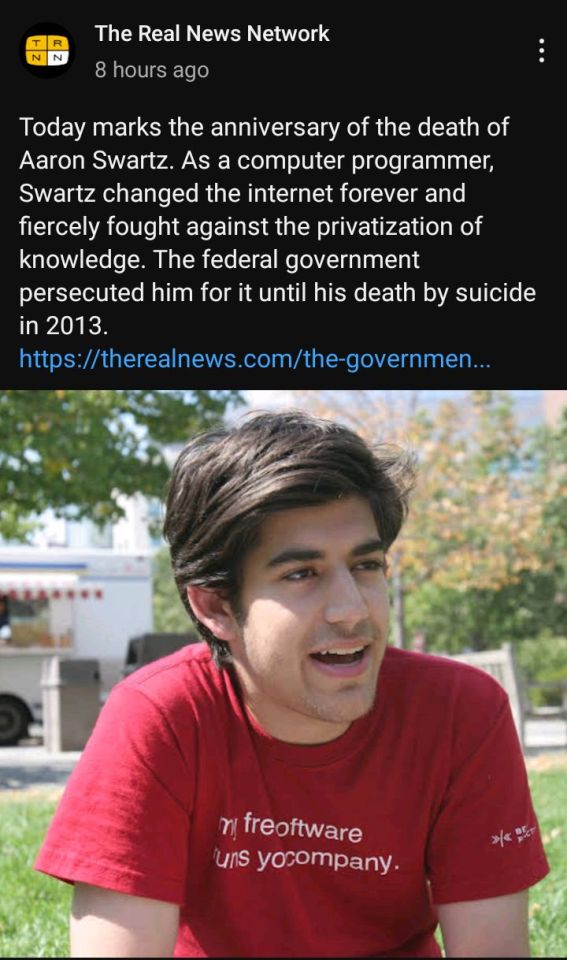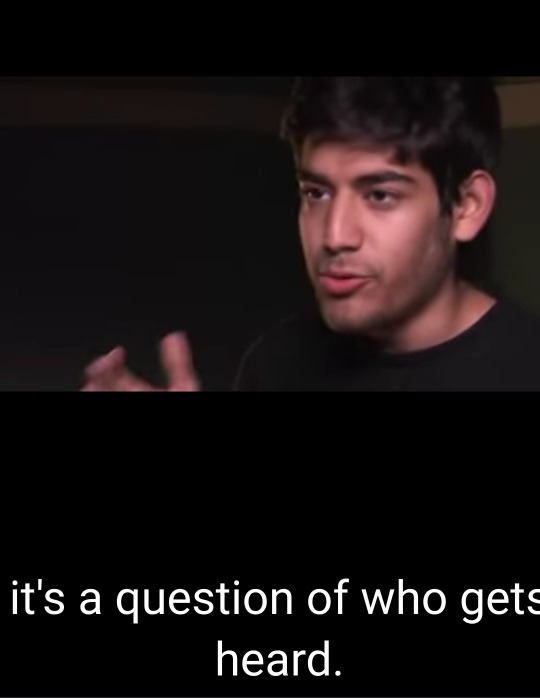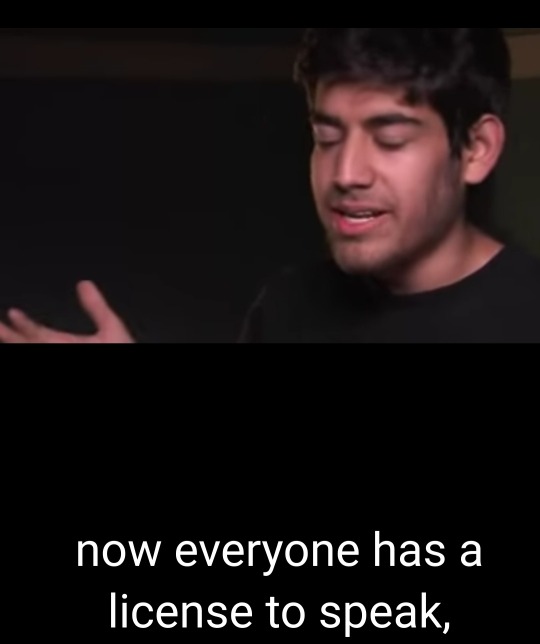#aaron swartz
Text
reblogs off since im tired of the dumb fucking discourse happening here, go read this long post and reblog it instead please.
ok so tumblr also really needs this reminder based on some posts ive seen around lately, the "babygirlification" of JSTOR is bad. like Bad Bad. did you all just collectively forget history? did you alll just forget they have blood on their hands? just because they publish science stuff in an ever so slightly more ethical way than springer and are a little silly on social media sometimes?
JSTOR killed aaron swartz (wikipedia). in his fight for freedom of information he downloaded papers off of jstor (with acedemic access from MIT) to share and make freely accessible (as all information should be), for this he was charged with wire fraud, computer fraud, unlawfully obtaining information from a protected computer, and recklessly damaging a protected computer. he was facing up to 50 years in prison and a 1 million USD fee for a simple act of downloading files he lawfully had access to. with this court case the US government drove one of the most important online activists and programmers (he is behind so much stuff you all take for granted) into suicide in the name of JSTOR.
JSTOR isn't the cool girl on the block. this isnt a call to boycott them (though please learn how to use things such as sci-hub and fight for open science and freedom of information in general please <3), but please dont glorify them as some sort of cutesy platform.
12K notes
·
View notes
Text

#anniversary#rest in power#aaron swartz#161#1312#class war#computer programming#federal government#federal govt#end the fed#bullied#bullies#internet#cyberpunk#environmental activism#activism#activist#ausgov#politas#auspol#tasgov#taspol#australia#fuck neoliberals#neoliberal capitalism#anthony albanese#albanese government#usa news#usa#united states
58 notes
·
View notes
Text
The fact that JSTOR was able to rebrand themselves on here as a friendly nonprofit after their contributions to the legal pressure murdered the ethnically jewish hacktivist that invented RSS at 26 years old with the assistance of MIT and the united states government should continue to infuriate us all forever. They are on this fucking app pretending to care about open access like they didn't help kill a man using the threat of federal prison for downloading papers.
#jstor#aaron swartz#he deserved a long life#may his memory be a blessing#i was 17 and I remember checking reddit when the news broke about the case#and then when he hung himself I was inconsolable
78 notes
·
View notes
Note
i read the wiki on the jstor / aaron case and i’m still confused i don’t quite understand what happened? he was being criminally charged for … downloading academic files ???
yes.
what you need to understand for context is that most academic papers are kept behind a paywall. the authors of those papers are most commonly folks like university professors who performed the research under grants from various places including the government and large corporations.
from there, there are only a limited number of options to publish the findings. once upon a time, it used to all be in print but now obviously everything is digital.
thus, the only way to access these scientific publications is through specific journals and their digital collections, all of which require payment to access. when you shell out $25, $50, or even $100 to download an article, none of that money goes to the researchers. they've already been compensated through their grants and have shared their findings with the public at no cost. the entire fee ends up with, in Aaron Swartz's case, JSTOR.
so all of the research and work was funded by some group. the work was actually performed by another group. the work was given to the public to further the collective knowledge of humanity. but in order for any of us to access the knowledge we have to pay for it. Aaron Swartz believed that was wrong. he believed that JSTOR was profiting off of an unnecessary middle man position that it created itself to enrich individuals.
so he used a Python script running on a laptop hidden in a maintenance closet at MIT to bulk download a large amount of publicly available academic papers from the JSTOR database with the intention of hosting them for free elsewhere on the web. JSTOR realized it and sent the feds after him.
here is JSTOR, on a site that exists today, in 2013 describing what Aaron Swartz did as "extremely serious."

despite JSTOR later dropping its case after backlash and despite Aaron having access rights to the database, he was later indicted on federal charges under the Computer Fraud and Abuse Act.
faced with up to 35 years of jail time and quickly-draining legal funds, Aaron committed suicide in his Brooklyn apartment, shortly after being denied further negotiation on his plea bargain by Assistant US Attorney Stephen Heymann.
more from maia on this topic from just a few months ago can be found here.
13 notes
·
View notes
Photo

the guerilla open access manifesto, aaron swartz
137 notes
·
View notes
Text
There is a very small group of eyes that I expect will see this, if any, but I am not having much success with searching on my own.
What exactly did Aaron Swartz do with the JSTOR files that was illegal or problematic? Is JSTOR not for free distribution of the documents they hold? How is his supposed intent to distribute the millions of documents a crime?
I understand that he slowed their site down when downloading the files and that he accessed the network in an unorthodox way to do the downloading, but those don't strike me as felonious, certainly not 50 years in jail and $1M felonious. The files weren't classified as far as I can tell, so what is the crime here?
6 notes
·
View notes
Link
Jan. 11, 2023 marks the tenth anniversary of the death of Aaron Swartz. Swartz had a prolific career as a computer programmer: At the age of 12 he created The Info Network, a user-generated encyclopedia widely credited as a precursor to Wikipedia. Swartz’s later work would transform the internet as we know it. He helped co-found Reddit, developed the RSS web feed format, and helped lay the technical foundations of Creative Commons, “a global nonprofit organization that enables sharing and reuse of creativity and knowledge through the provision of free legal tools.” In 2011, Swartz was arrested and indicted on federal charges after downloading a large number of academic articles from the website JSTOR through the MIT network. A year later, prosecutors added an additional nine felony counts against Swartz, ultimately threatening him with a million dollars in fines and up to 35 years in prison. Swartz was found dead in his Brooklyn apartment from suicide on Jan. 11, 2013. TRNN Editor-in-Chief Maximillian Alvarez speaks with the co-hosts of the Srsly Wrong podcast, Shawn Vulliez and Aaron Moritz, about the life and legacy of Aaron Swartz.
26 notes
·
View notes
Text
Daily reminder that JSTOR can and should get fucked
3 notes
·
View notes
Text
Aaron Hillel Swartz e o seu HackAtivismo

Nasceu em: 8 de novembro de 1986, em Illinois, Chicago, Estados Unidos. Era filho de Susan e Robert Swartz, proprietário da empresa Mark Williams Company, que foi uma das pioneiras no lançamento de sistemas operacionais Unix.
Com 12 anos criou um site chamado: TheInfo.org ( Grande Banco de Dados, que funciona como uma espécie de Wikipedia, antes mesmo da criação e lançamento da Wiki) , onde posteriormente, ganhou o Prêmio ArsDigita, para jovens criadores de "websites não comerciais, úteis, educacionais e colaborativas".
Aos 14, se deu a colaboração na invenção do RSS (é um formato de distribuição de informações em tempo real pela internet).
Um ano após, foi admitido no W3C (World Wide Web Consortium), onde foi o autor do RFC 3870. Coautor do Markdown (linguagem voltada para formatação de textos) e fez parte do time que deu origem ao Creative Commons (CC), que já falamos aqui no blog.

Próximo dos 18, ele ingressou na Universidade de Stanford, na Califórnia, EUA. Já no seu primeiro ano, graças ao financiamento que recebeu do Y Combinator, deu inicio a sua primeira empresa a Infogami (uma espécie de WordPress nos tempos atuais), na qual deu suporte ao seu projeto subsequente, a Open Library (biblioteca digital, colaborativa, aberta), que atualmente, quem é responsável é a Internet Archive ("Museu digital").
Onde em 2006, fundiu sua empresa, a Infogami com o Reddit, durante o desenvolvimento do framework da Infogami e Reddit, foi se criado o web.py (biblioteca em python), no ano seguinte se desligou da empresa, justificativa relatada em seu blog.
Com 25 anos, Swartz fundou a Watchdog.net, “the good government site with teeth,” (o site do bom governo com dentes) para agregar e visualizar dados sobre políticos em exercício.
Naquele mesmo ano, ele escreveu o "Guerilla Open Access Manifesto (Manifesto da Guerrilha do Livre Acesso)." Inclusive, foi onde retirei o trecho que compartilhei aqui na rede, anteriormente a esse post.
Já em 2010, Aaron cofundou a Demand Progress (organização norte-americana de ciberativismo, focada em "conquistar progressivas mudanças na política pública, em especial nas liberdades e direitos civis e reforma governamental." ).
Teve papel ativo no protesto e petição a favor da derrubada da iniciativa de lei Stop Online Piracy Act (SOPA ou na tradução literal, "Pare com a Pirataria Ilegal").
Segundo uma matéria da Super Abril, que discorre bem sobre esse projeto de lei.
"Na teoria, faz sentido impedir a pirataria. Todo mundo sabe que é contra a lei. Mas os dois projetos vão bem além disso e não vão afetar só os sites norte-americanos. Entenda alguns motivos do protesto:
Os projetos dão ao governo liberdade para pedir ao Google e outras ferramentas de busca para excluir determinados sites do resultado das pesquisas. Ou seja, o governo poderia ter controle sobre a lista de links que você pode acessar quando joga uma coisa no Google.
O governo também pode pedir aos grandes provedores de internet para bloquear o acesso a alguns sites para os seus usuários. É exatamente a mesma estratégia usada para censurar conteúdos adultos ou políticos na Síria e na China.
Se o governo descobrir que você encontrou uma ferramenta online que burla o bloqueio, ele também pode bani-la. O problema é que algumas dessas ferramentas são bem úteis a grupos que lutam pelos direitos humanos em lugares onde há censura.
A proposta também pode impedir que empresas façam propaganda em sites que façam parte da lista negra do governo.
Se você realmente precisar das informações da Wikipedia, pode dar um jeito de driblar o bloqueio. Mas, no futuro, isso pode não ser mais possível."
Por Otavio Cohen Atualizado em 21 dez 2016, 10h16 - Publicado em 18 jan 2012, 11h37.
Retomando, graças as ofensivas de personagens históricos como Aaron, o projeto de lei foi anulada.
Adjunto a Virgil Griffith, Swartz trabalhou no design e a implementação do Tor2web, o que viria a ser futuramente, o que conhecemos como o Browser Tor, que visa a privacidade e o anonimato, muito conhecido por proporcionar o acesso a Deep Web.
Aaron foi “incriminado” por ter copiado, em 2011, 4,8 milhões de artigos científicos do repositório JSTOR, através de um acesso do Massachusetts Institute of Technology – MIT.
Ele não chegou a distribuir os arquivos na rede, muito menos obteve algum lucro com isso. Seu objetivo foi protestar contra o sistema de controle e mercantilização do conhecimento.
No qual, para um usuário comum obter acesso aos artigos, era cobrado 8 centavos por página, para uma empresa que desde a sua fundação detinha o titulo de ser sem fins lucrativos e livre, pois os documentos federais não são abrangidos pelos direitos de autor.
Consequentemente, nenhum autor recebe remuneração por essas vendas, sem falar que na maioria das vezes as pesquisas são financiadas com dinheiro público.
Após Carl Malamud, fundador da Public.Resource.Org, incitar e liberar o acesso e download destes arquivos, em apenas 17 bibliotecas que tem acesso ao PACER, em sua entrevista ao The New York Times.
Swartz usou o script de computador Perl rodando num servidor em nuvem da Amazon para baixar os documentos, usando as credenciais da biblioteca de Sacramento.
É importante frisar que a PACER ainda cobra por página, mas os clientes que usam o Firefox tem a opção de salvar os documentos para acesso público livre com um plug-in, chamado RECAP.
Na noite de 6 de janeiro de 2011, Swartz foi preso próximo ao campus de Harvard pela polícia do MIT e agentes secretos do Estados Unidos. Ele foi indiciado no Tribunal do Distrito de Massachusetts por duas acusações estaduais: arrombamento e invasão com intenção de cometer um crime.
Não irei descrever todo o laudo do processo, mas vocês poder encontrar notícias que documentaram toda essa parte, neste link.
Swartz cometeu suicídio em 11 de janeiro de 2013. Após sua morte, os procuradores federais retiraram as acusações.
Disponibilizarei na referência links para paginas, documentários, noticias sobre o caso, etc.
Dúvidas, sugestões, opiniões, deixem nos comentários, obrigada por lerem até aqui e até logo.
Para saber mais sobre a história de Aaron:
Aaron Swartz - Wikipedia
Aaron Swartz e a luta pelo conhecimento livre
Documentárrio: O Menino da Internet: A História de Aaron Swartz - Dublado PT-BR - Versão Completa
Filme: Killswitch
Experiência trabalhando num escritório - relato no blog
Hackers: Aaron Swartz e Alexandra Elbakyan | Nerdologia Tech
Podcast: Engenharia Reversa - Ep.01 - Aaron Swartz, a história do ativista e co-criador do Reddit e do RSS
Relato sobre depressão em seu blog
Sci-Hub e a pirataria acadêmica (#Pirula 218)
Vídeo de vigilância do MIT que levou à prisão de Aaron Swartz
Plataformas e Projetos que ele criou ou foi cofundador:
Blog de Aaron: PENSAMENTO BRUTO
Creative Commons (CC)
Demand Progress
Guerilla Open Access Manifesto
Markdown
Open Library
Repositório: TheInfo.org
RSS
Reddit
Web.py - relato do blog
Criado em sua Homenagem: Instituto Aaron Swartz
8 notes
·
View notes
Text

With enough of us, around the world, we'll not just send a strong message opposing the privatization of knowledge — we'll make it a thing of the past. Will you join us?
14 notes
·
View notes
Text

View on Twitter
Aaron Swartz would have been 36 today.
Aaron committed suicide after being sentenced to 35 years in prison by US authorities for transferring and sharing scientific articles from JSTOR.
(Source)
12 notes
·
View notes
Link
Vi segnalo un libro gratuito sulla vita dell’hacker Aaron Swartz scritto dal prof. Giovanni Riccardi. PDF e EPUB del libro gratis in Creative Common License.
La vita troppo breve dell’hacker Aaron Swartz – morto suicida l’11 gennaio del 2013 – ha tantissimi aspetti incredibili. Piccolo genio dell’informatica cresciuto in un sobborgo di Chicago, incontra, da adolescente, studiosi del calibro di Tim Berners-Lee e Lawrence Lessig e lavora con loro per costruire le architetture informatiche, e le licenze d’uso, del futuro. Con un cambio di vita radicale, deciderà poi di dedicarsi all'attivismo politico e tecnologico proprio mentre i suoi coetanei più talentuosi sfruttano l’onda della Silicon Valley per arricchirsi. Lui dedicherà, invece, le sue energie e il suo talento a combattere per l’open access, per la sicurezza delle comunicazioni, per l’anonimato e per “liberare” contenuti e cultura dai confini, e pedaggi, delle grandi banche dati. A un certo punto, però, il governo degli Stati Uniti d’America lo prenderà di mira e, lentamente, la potente macchina giudiziaria americana lo stritolerà. Il suo insegnamento, le sue teorie, la sua passione sono ancora oggi, a distanza di dieci anni dalla sua morte, esempio per tantissimi utenti, hacker e cittadini della società dell’informazione.
4 notes
·
View notes
Text
“We need to take information, wherever it is stored, make our copies and share them with the world. We need to take stuff that's out of copyright and add it to the archive. We need to buy secret databases and put them on the Web. We need to download scientific journals and upload them to file sharing networks... With enough of us, around the world, we’ll not just send a strong message opposing the privatization of knowledge - we’ll make it a thing of the past. Will you join us?”
- Aaron Swartz, Guerilla Open Access Manifesto
29 notes
·
View notes





